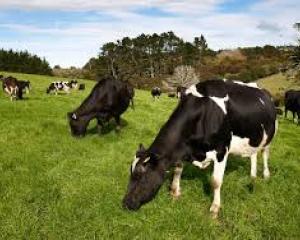The lowering last week of the forecast payment Fonterra will make to farmers for milk this season has much wider repercussions than just the bank balances of the country's 14,000 dairy farmers.
Not only is dairy our single largest export earner, but a modern dairy farm requires a vast array of inputs - from cleaning chemicals to machinery, seed and fertiliser - all of which support ancillary services that will also be affected.
Fonterra, which sets the milk price for the country's other dairy companies, announced last week a second decline in the forecast payout for this season. It started with May's forecast payout range for the 2011-12 season, before retentions, of $6.75 to $6.85 a kg of milk solids (kg/ms) and followed with the opening forecast for the 2012-13 season of $5.95-$6.05 kg/ms. Last week, this was lowered further to $5.65 to $5.75 kg/ms.
In the 2010-11 season the final payout was $7.90 a kg/ms.
Two forces have been at play here: initially it was softening markets, although appreciating prices on the fortnightly global dairy trade auction show some firming, but the bigger factor has been a high exchange rate which, of course, reduces the amount of money returned to the accounts of New Zealand exporters.
Earlier this year, the high currency decimated meat and wool incomes, turning a promising season into an average one. The dairy sector held on grimly, but it looks like it will not dodge the bullet this year.
Many hours have been spent by Government officials, economists and lobby groups finding ways to insulate the New Zealand dollar value from offshore forces, all of which have been unsuccessful.
High market prices have previously been blamed for rising cheese, butter and milk consumer prices so, with raw-milk prices easing, consumers will be watching to see if that translates to lower supermarket prices.
Federated Farmers dairy section chairman Willy Leferink has said the latest decline equated to a drop in price of a relatively negligible 3c-4c a litre.
But, this price correction will focus attention on supermarket pricing of dairy products, given the Commerce Commission last month said it was satisfied the methodology used by Fonterra to set its farm-gate milk price provided market conductibility.
Supermarket pricing is coming under increasing scrutiny, since independent food retailers began selling milk at prices significantly lower than those available through the two large supermarket chains.
However, this current global dairy price correction appears to be little more than a glitch in what is a trend of appreciating food prices that have already caused public protest in African and the Middle Eastern countries.
That pressure is only going to be heightened with the World Bank last week announcing food prices rose 10% between June and July, and prices in July were 6% higher than the same month a year earlier, due mainly to drought in some of the largest arable producing areas.
The Food and Agriculture Organisation of the United Nations is warning food production will have to increase 70% by 2050 to feed an extra 2.3 billion people in the world, potentially putting pressure on people, land, environment and technology to an unknown degree.
It is doubtful developing countries will be key customers of New Zealand's relatively high-priced protein food, but all food prices will be pulled along by this upswing in demand. Certainly, New Zealand farming techniques will be a valuable export commodity.
In the immediate future, there is likely to be a reprieve in the large number of farms converting to dairying from cropping, sheep and beef.
Specialist agricultural banker Rabobank said milk production had increased 50% in the past decade, but future growth would be slower and based on higher per cow production, as access to easy credit dried up and constraints were applied to the industry to address concerns about its environmental impact.
Farming could be about to enter an era of consolidation, but ending the extreme boom-and-bust income cycles remains a challenge.






